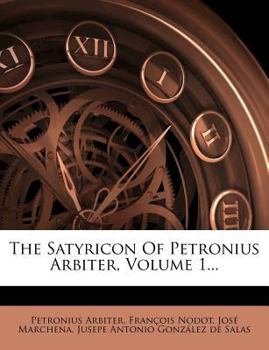The Satyricon of Petronius Arbiter, Volume 1...
"The Satyricon" is a Latin work of fiction believed to have been written by Gaius Petronius, though the identity of the author is debated. Only fragments of the original novel have survived. The work is a picaresque narrative that recounts the misadventures of the narrator, Encolpius, and his companions as they navigate a debauched and decadent Roman society.
Known for its frank depiction of sexual themes, social satire, and vivid portrayal of Roman life, "The Satyricon" offers a unique glimpse into the culture of the Roman Empire during the 1st century AD. The surviving episodes, including the famous "Dinner at Trimalchio's," showcase Petronius's sharp wit and keen observations of human behavior.
This edition includes scholarly commentary by Fran ois Nodot, Jos Marchena, and Jusepe Antonio Gonz lez de Salas, providing additional context and insights into this important work of classical literature. "The Satyricon" remains a valuable and entertaining read, offering a window into a world of excess, intrigue, and social commentary.
This work has been selected by scholars as being culturally important, and is part of the knowledge base of civilization as we know it. This work was reproduced from the original artifact, and remains as true to the original work as possible. Therefore, you will see the original copyright references, library stamps (as most of these works have been housed in our most important libraries around the world), and other notations in the work.
This work is in the public domain in the United States of America, and possibly other nations. Within the United States, you may freely copy and distribute this work, as no entity (individual or corporate) has a copyright on the body of the work.
As a reproduction of a historical artifact, this work may contain missing or blurred pages, poor pictures, errant marks, etc. Scholars believe, and we concur, that this work is important enough to be preserved, reproduced, and made generally available to the public. We appreciate your support of the preservation process, and thank you for being an important part of keeping this knowledge alive and relevant.
Related Subjects
History




